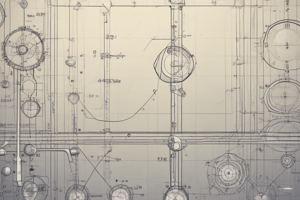Podcast
Questions and Answers
What is one of the main reasons for converting units?
What is one of the main reasons for converting units?
- To make measurements more precise
- To express measurements in a more convenient or familiar unit (correct)
- To simplify calculations
- To compare values between different systems of measurement
What is the conversion factor from milligrams to grams?
What is the conversion factor from milligrams to grams?
- 1 g = 100 mg
- 1 g = 1000 mg (correct)
- 1 g = 500 mg
- 1 g = 10 mg
How do you convert from Celsius to Fahrenheit?
How do you convert from Celsius to Fahrenheit?
- °F = (°C × 5/9) - 32
- °F = (°C × 9/5) + 32 (correct)
- °F = (°C × 5/9) + 32
- °F = (°C × 9/5) - 32
What is the conversion factor from liters to milliliters?
What is the conversion factor from liters to milliliters?
What is the third step in the conversion process?
What is the third step in the conversion process?
What is a tip for checking the conversion of units?
What is a tip for checking the conversion of units?
Flashcards are hidden until you start studying
Study Notes
Unit Conversions
Why Convert Units?
- To express measurements in a more convenient or familiar unit
- To compare values between different systems of measurement
- To perform calculations and solve problems involving different units
Types of Unit Conversions
- Length:
- Meter (m) to/from:
- Centimeter (cm): 1 m = 100 cm
- Millimeter (mm): 1 m = 1000 mm
- Kilometer (km): 1 km = 1000 m
- Meter (m) to/from:
- Weight/Mass:
- Gram (g) to/from:
- Milligram (mg): 1 g = 1000 mg
- Kilogram (kg): 1 kg = 1000 g
- Gram (g) to/from:
- Volume:
- Liter (L) to/from:
- Milliliter (mL): 1 L = 1000 mL
- Cubic centimeter (cm³): 1 L = 1000 cm³
- Liter (L) to/from:
- Time:
- Second (s) to/from:
- Millisecond (ms): 1 s = 1000 ms
- Minute (min): 1 min = 60 s
- Second (s) to/from:
- Temperature:
- Celsius (°C) to/from:
- Fahrenheit (°F): °F = (°C × 9/5) + 32
- Kelvin (K): K = °C + 273.15
- Celsius (°C) to/from:
Conversion Steps
- Identify the original unit and the desired unit
- Choose the correct conversion factor
- Multiply or divide the original value by the conversion factor
- Simplify the result and express it in the desired unit
Tips and Tricks
- Memorize common conversion factors
- Use dimensional analysis to check your work
- Convert units in steps, if necessary (e.g., cm to m to km)
Unit Conversions
- Unit conversions are necessary to express measurements in a more convenient or familiar unit, compare values between different systems of measurement, and perform calculations involving different units.
Types of Unit Conversions
Length
- 1 meter (m) is equal to 100 centimeters (cm) or 1000 millimeters (mm)
- 1 kilometer (km) is equal to 1000 meters (m)
Weight/Mass
- 1 gram (g) is equal to 1000 milligrams (mg) or 0.001 kilograms (kg)
- 1 kilogram (kg) is equal to 1000 grams (g)
Volume
- 1 liter (L) is equal to 1000 milliliters (mL) or 1000 cubic centimeters (cm³)
Time
- 1 second (s) is equal to 1000 milliseconds (ms) or 1/60 minute (min)
- 1 minute (min) is equal to 60 seconds (s)
Temperature
- Celsius (°C) to Fahrenheit (°F): °F = (°C × 9/5) + 32
- Celsius (°C) to Kelvin (K): K = °C + 273.15
Conversion Steps
- Identify the original unit and the desired unit
- Choose the correct conversion factor
- Multiply or divide the original value by the conversion factor
- Simplify the result and express it in the desired unit
Tips and Tricks
- Memorize common conversion factors
- Use dimensional analysis to check your work
- Convert units in steps, if necessary (e.g., cm to m to km)
Studying That Suits You
Use AI to generate personalized quizzes and flashcards to suit your learning preferences.





